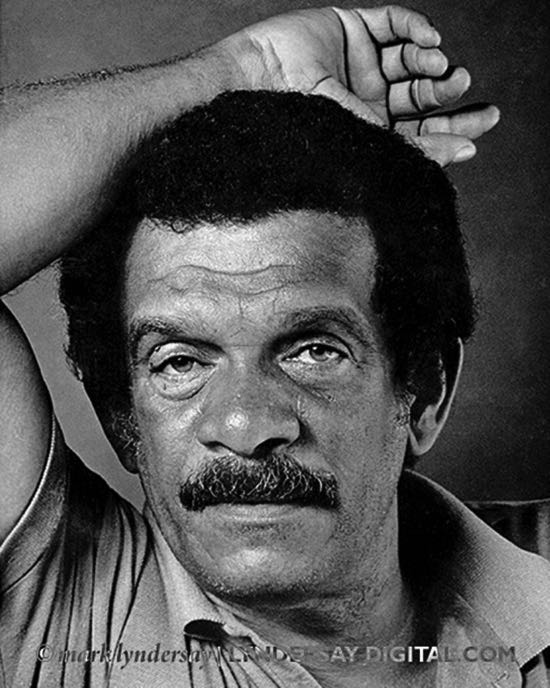Film: Walcott
23/05/11 23:10 Filed in: Technique

Derek Walcott, photographed for the press kit for The Last Carnival. I shot this with a Pentax 645 on Tri-X film lit with a single Sunpak 611 strobe bounced into a Reflectasol umbrella. The picture would be reproduced constantly in the Guardian throughout the 1980’s. Photograph by Mark Lyndersay.
In the early 1980’s I was quite active in the theatre and working at Colonial Life as their public relations officer. The Trinidad Tent Theatre, conceptualised by Helen Camps, was where I was hanging my hat in those days, doing photography, promotional work and even some print design, back in the pre-computer days of cowgum paste ups.
I was, I suppose, the go-to guy for theatre promotion, largely because nobody else could be bothered with the unpaid, unheralded work.
Derek Walcott was on an extended visit to Trinidad to restage his 1970 play In a Fine Castle as The Last Carnival and he’d decided to put the play on at the old Government Training Building, a structure that had been abandoned for occupation and would later be classified as uninhabitable and demolished.
Walcott is acknowledged as a brilliant poet and the recognition he’s received in that sphere has tended to overshadow the significant work he’s done as a playwright. I am a fan of his plays Pantomime and Remembrance, which I reviewed back in the days when I served as a theatre critic for the Guardian.
I was still bobbing back and forth between both roles when the opportunity to work with Walcott on The Last Carnival came along.
The playwright and director brought two promising young actors back from the US with him for the production, Cotter Smith and Fran McDormand, who would go on to become quite well known in Hollywood in just a few years, winning an Academy Award for Fargo.
As part of the promotion, photography was scheduled at the Cascade home of Clara Rosa de Lima who was a supporter of the production. At the shoot, I asked Walcott if he was interested in sitting for a photograph. He declined quite bluntly.
I progressed with the photography, with Walcott looking in from time to time. Finally, I was done and I looked around at the playwright.
“You have three,” he said, brusquely.
He sat in the chair and I asked him to place his hand on his head, quickly deciding to put the mind and the instrument of his work together in the frame. I shot, one, two, three photographs and then Walcott got up and walked away without a word.
I learned a lot from the experience working with Walcott on the project. One morning, I came by to visit him at the Hotel Normandie and had to wait fifteen minutes until he was available for the discussion.
I have to confess that I was a bit miffed at the delay, particularly since I’d taken time off work for the meeting, but when I entered the room, I found out why.
Walcott set aside a certain number of hours each morning to work at his craft, and during that time, nobody was allowed to disturb him. When I entered the room, I found him surrounded by sketchbooks, notebooks and reference materials strewn all over the bed he was working on. It was a lesson about respecting the need to work at one’s craft that I never forgot.
As a postscript, I should note that The Last Carnival represented the pinnacle of my brief encounter with the famous poet. The play failed to draw an audience, who were, apparently, concerned about safety issues at the venue. I charged Walcott only the costs incurred on the project, but this apparently upset him.
A review of the Branch of the Blue Nile on Gayelle almost a year later when it was produced in Trinidad was also not met well by the playwright who matched my disapproval of the play by putting my name, cited as part of a disparaging line, in the play. I frankly found it impossible to be annoyed at having my name mentioned, if only briefly and negatively in a Walcott play, and I confess to sneaking around backstage at the Tent Theatre to hear the line spoken.
It would be the last review of a theatrical production that I’d ever do, but things would get worse one more time. I saw Walcott at an event at Judy Stone’s Woodbrook Theatre after he won the MacArthur grant and walked over, hand outstretched to congratulate him.
Walcott slapped my hand away and Charles Applewhaite came by a few moments later to whisper in my ear, “Welcome to the club.”
blog comments powered by Disqus
